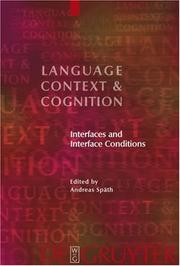| Listing 1 - 2 of 2 |
Sort by
|
Book
ISBN: 9783110227468 9783110227475 3110227479 3110227460 1282784080 9786612784088 Year: 2010 Publisher: Berlin De Gruyter
Abstract | Keywords | Export | Availability | Bookmark
 Loading...
Loading...Choose an application
- Reference Manager
- EndNote
- RefWorks (Direct export to RefWorks)
In the last few years a lively discussion on information packaging has arisen, where traditional dichotomies Theme/Rheme, Topic/Comment and Focus/Background have been taken up again and partly reinterpreted. The discussion is mainly being held in syntax, but also in the fields of semantics and pragmatics. Some remarkable progress has been made especially in Focus phonology.Even if the role of information conveying and information packaging in the Indoeuropean languages was hinted at as early as in the classical studies of the Neogrammarians, this field has remained neglected in today's historical linguistics. This volume tries to partly cover this lack with a sample of papers which offer a various range of new empirical data analyzed from the point of view of information structure. The novelty of the papers consists in the modern theoretical perspective from which the data are analyzed and in the various phenomena considered, which range from the rise of clitic elements to word order change and verb movement. Editorial board Dr. habil. Kai Alter (Newcastle University Medical School) Prof. Dr. Ulrike Demske (Universität des Saarlandes) Prof. Dr. Ewald Lang (Humboldt-Universität zu Berlin) Prof. Dr. Rosemarie Lühr (Friedrich-Schiller-Universität Jena) Prof. Dr. Thomas Pechmann (Universität Leipzig) Prof. em. Dr. Anita Steube (Universität Leipzig)
Psycholinguistics --- Grammar --- Didactics of languages --- Grammar, Comparative and general --- Language acquisition. --- Language and languages --- Language change. --- Linguistic change. --- Topic and comment. --- Variation. --- Language acquisition --- Linguistic change --- Change, Linguistic --- Language change --- Historical linguistics --- Characterology of speech --- Language diversity --- Language subsystems --- Language variation --- Linguistic diversity --- Variation in language --- Acquisition of language --- Developmental linguistics --- Developmental psycholinguistics --- Language development in children --- Psycholinguistics, Developmental --- Interpersonal communication in children --- Functional sentence perspective (Grammar) --- Predicate and subject (Grammar) --- Subject and predicate (Grammar) --- Theme and rheme --- Topic and comment (Grammar) --- Focus (Linguistics) --- Topic and comment --- Variation --- Acquisition --- Subject and predicate --- Syntax --- Linguistics --- Philology --- Information Structure. --- Language Change.


ISBN: 9783110195477 311019547X 3110926008 9783110926002 Year: 2012 Publisher: Berlin Boston
Abstract | Keywords | Export | Availability | Bookmark
 Loading...
Loading...Choose an application
- Reference Manager
- EndNote
- RefWorks (Direct export to RefWorks)
The volume contains articles that focus on the interface between linguistic and conceptual knowledge. The issues addressed in the volume include the preconditions of every level of the language system that are required for the transformation of linguistic information into conceptual representations. In accordance with Chomsky's Minimalist language model, the language system is embedded into the performative systems where language is a part of the cognitive competence of human beings, i.e. system of articulation and perception (A/P) and the conceptual-intentional system (C/I). During the formation of linguistic structures, every performative system obtains well-formed representations as its input information. The articles of the volume show how interface conditions determine the linguistic representations on each level of the linguistic system. Interface conditions result in requirements for the ordering of linguistic elements. The syntactic transformation achieves a point, where the linguistic structure formation branches to two distinct representational levels. Both levels deliver instructions for the systems of performance A/P and C/I. Linearization takes place on the syntactic surface of a sentence. The linearization of linguistic elements is manifest at the derivational point of Spell-out and also on the level of the phonological form (PF). This means that on the one hand, linearization is relevant to the phonetic aspect of linguistic expressions, and on the other hand, the interpretation of linguistic utterances is based on hierarchical structures. On the level of Logical Form (LF) all operations apply which don't have any influence on the linear order in overt syntax. In addition they affect the generation of hierarchical structures. The structure obtained on LF is the representational format of the semantic form of a sentence.
Grammar, Comparative and general --- Prosodic analysis (Linguistics). --- Psycholinguistics. --- Semantics. --- Syntax. --- Prosodic analysis (Linguistics) --- Language, Psychology of --- Language and languages --- Psychology of language --- Speech --- Multidimensional phonology --- Polysystemic phonology --- Prosodic phonology --- Speaking styles --- Formal semantics --- Semasiology --- Semiology (Semantics) --- Syntax --- Psychological aspects --- Psychology --- Linguistics --- Thought and thinking --- Phonetics --- Comparative linguistics --- Information theory --- Lexicology --- Meaning (Psychology) --- Phonology --- Philology --- Grammar, Comparative and general Syntax --- Empirical Prosody. --- Information Structure. --- Syntax and Semantics. --- Theoretical Linguistics.
| Listing 1 - 2 of 2 |
Sort by
|

 Search
Search Feedback
Feedback About UniCat
About UniCat  Help
Help News
News